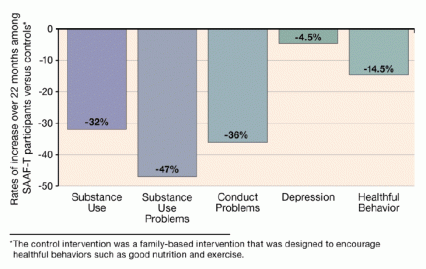NIDA-supported researchers have developed a family-centered prevention program for adolescents and successfully tested it in a rural African American population. Youths who participated in the intervention at age 16 reported fewer conduct problems and depressive symptoms and less substance abuse at age 17‒18, compared to peers exposed to a control intervention (see figure below).
Dr. Gene Brody and colleagues at the Center for Family Research (CFR), University of Georgia, created Strong African American Families‒Teen (SAAF‒T) to address a gap in the prevention tool chest: Few interventions exist for adolescents to deter the rise in behavioral problems that occurs across the teen years, and the lack is particularly acute for African Americans.
In SAAF‒T, teens and their primary caregivers attend five 2-hour meetings administered by trained leaders from the local community. Teens and caregivers meet separately for the first hour of each session, and come together to practice what they have learned in the second.
The CFR researchers drew on 10 years of their own epidemiological research in rural Georgia to fashion the content of SAAF‒T. That work identified parent and youth skills that were negatively associated with teen emotional and behavioral problems. Based on those findings, SAAF‒T group leaders teach adolescents:
- The importance of having and following household rules
- Strategies for countering racism
- The importance of academic success
- Goal development
- Strategies for achieving academic and occupational goals
Group leaders teach caregivers to:
- Monitor their teens consistently
- Deal with discrimination
- Establish clear expectations about their teen’s substance use
- Provide academic support
- Communicate and work with their teens to solve problems
Participants in the SAAF‒T effectiveness trial were 502 teens and caregivers in the rural Georgia counties where the researchers conducted their epidemiological studies. Interviewed in 12th grade, teens who attended SAAF‒T meetings in 10th grade reported 36 percent fewer conduct problems, 32 percent less frequent substance use, and 47 percent fewer substance use problems compared to teens in the control program. SAAF-T reduced depressive symptoms to a lesser degree.
The control intervention was structured identically to SAAF-T, but focused on good nutrition, exercise, and informed consumer behavior. It, too, was effective: At followup, participants reported 14.5 percent more healthful behaviors than SAAF‒T participants.
 SAAF-T Intervention Attenuates Adolescent Rise in Problems Youths who participated in Strong African American Families-Teen (SAAF-T) and peers who received an equally intensive control intervention experienced increases in both problems and healthful behaviors. Among the SAAF-T group, relative to the control group, the increases in specific problems were attenuated by 4.5 percent (depression) to 47 percent (substance use-related problems). The control group—whose intervention focused on healthful behaviors, such as good nutrition and exercise—increased such behaviors more than the SAAF-T group.
SAAF-T Intervention Attenuates Adolescent Rise in Problems Youths who participated in Strong African American Families-Teen (SAAF-T) and peers who received an equally intensive control intervention experienced increases in both problems and healthful behaviors. Among the SAAF-T group, relative to the control group, the increases in specific problems were attenuated by 4.5 percent (depression) to 47 percent (substance use-related problems). The control group—whose intervention focused on healthful behaviors, such as good nutrition and exercise—increased such behaviors more than the SAAF-T group.This study was supported by NIH grants DA027827 and DA021736.
Sources:
Brody, G.H., et al. Family-centered program deters substance use, conduct problems, and depressive symptoms in black adolescents. Pediatrics 129(1):1-8, 2012. Full Text
Kogan, S.M., et al. The Strong African American Families-Teen Trial: Rationale, Design, Engagement processes, and Family-Specific Effects. Prev Sci DOI 10.1007/s11121-011-0257-y. Abstract
